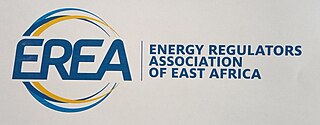
A public utility company is an organization that maintains the infrastructure for a public service. Public utilities are subject to forms of public control and regulation ranging from local community-based groups to statewide government monopolies.

The Financial Services Authority (FSA) was a quasi-judicial body accountable for the regulation of the financial services industry in the United Kingdom between 2001 and 2013. It was founded as the Securities and Investments Board (SIB) in 1985. Its board was appointed by the Treasury, although it operated independently of government. It was structured as a company limited by guarantee and was funded entirely by fees charged to the financial services industry.

The Office of Communications, commonly known as Ofcom, is the government-approved regulatory and competition authority for the broadcasting, telecommunications and postal industries of the United Kingdom.

The Strategic Rail Authority (SRA) was a non-departmental public body in the United Kingdom set up under the Transport Act 2000 to provide strategic direction for the railway industry. Its motto was 'Britain's railway, properly delivered'. It was abolished by the Railways Order 2006, its functions being absorbed by the Department for Transport or the Office of Rail Regulation.
In general, compliance means conforming to a rule, such as a specification, policy, standard or law. Compliance has traditionally been explained by reference to deterrence theory, according to which punishing a behavior will decrease the violations both by the wrongdoer and by others. This view has been supported by economic theory, which has framed punishment in terms of costs and has explained compliance in terms of a cost-benefit equilibrium. However, psychological research on motivation provides an alternative view: granting rewards or imposing fines for a certain behavior is a form of extrinsic motivation that weakens intrinsic motivation and ultimately undermines compliance.

The Office of Gas and Electricity Markets (Ofgem), supporting the Gas and Electricity Markets Authority, is the government regulator for the electricity and downstream natural gas markets in Great Britain. It was formed by the merger of the Office of Electricity Regulation (OFFER) and Office of Gas Supply (Ofgas).
A regulatory agency or independent agency is a government authority that is responsible for exercising autonomous dominion over some area of human activity in a licensing and regulating capacity.

The Financial Reporting Council (FRC) is an independent regulator in the UK and Ireland based in London Wall in the City of London, responsible for regulating auditors, accountants and actuaries, and setting the UK's Corporate Governance and Stewardship Codes. The FRC seeks to promote transparency and integrity in business by aiming its work at investors and others who rely on company reports, audits and high-quality risk management.
In politics, a revolving door can refer to two distinct phenomena.

The Legal Services Board is an independent body responsible for overseeing the regulation of lawyers in England and Wales. It is a non-departmental public body sponsored by the Ministry of Justice, created through the Legal Services Act of 2007.
The electricity sectors of the Republic of Ireland and Northern Ireland are integrated and supply 2.5 million customers from a combination of coal, peat, natural gas, wind and hydropower. In 2022, 34 TWh were generated. In 2018 natural gas produced 51.8%, while wind turbines generated 28.1%, coal 7%, and peat 6.8% of Ireland's average electricity demand. In 2020 wind turbines generated 36.3% of Ireland's electrical demand, one of the highest wind power proportions in the world. While the United Kingdom was one of the first countries in the world to deploy commercial nuclear power plants, the island of Ireland has never had a nuclear power plant built on either side of the Irish border. Nuclear power in Ireland was discussed in the 1960s and 1970s but ultimately never phased in, with legislation now in place explicitly forbidding its introduction.

The Body of European Regulators for Electronic Communications (BEREC) is the body in which the regulators of the telecommunications markets in the European Union work together. Other participants include representatives of the European Commission, as well as telecommunication regulators from the member states of the EEA and of states that are in the process of joining the EU.
Promontory Financial Group, a wholly owned subsidiary of IBM, is a global consulting firm that advises clients on a variety of financial services matters, including regulatory issues, compliance, risk management, liquidity, restructuring, acquisitions, due diligence, internal investigations and cyber security.

The Financial Conduct Authority (FCA) is a financial regulatory body in the United Kingdom. It operates independently of the UK Government and is financed by charging fees to members of the financial services industry. The FCA regulates financial firms providing services to consumers and maintains the integrity of the financial markets in the United Kingdom.

The Energy Regulators Regional Association (ERRA) is a voluntary organization of independent energy regulatory bodies primarily from the Central European and Eurasian region, with Affiliates from Africa, Asia the Middle East and the US.

The Charities Regulator is the operational name of the Charities Regulatory Authority, the statutory authority responsible for the regulation of charities in Ireland. The organisation is made up of a board, with four sub-committees, and as of 2019, a staff of 38, including a chief executive.

The Energy Regulators Association of East Africa (EREA) is a non-profit organisation mandated to spearhead harmonisation of energy regulatory frameworks, sustainable capacity building and information sharing among the List of energy regulatory bodies in the East African Community. Its key objective is to promote the independence of national regulators and support the establishment of a robust East African energy union.
Jonathan Brearley is the chief executive officer of Great Britain's energy regulator Office of Gas and Electricity Markets, Ofgem.











